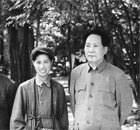Comment
Chained boy raises issue of care for migrant children
By Fan Zhengwei (China Daily)
Updated: 2010-02-05 09:39
 |
Large Medium Small |
The scene of a two-year old boy from a migrant family being tethered to a pole in the street in Fangshan district aroused deep sympathy from Beijingers this winter. Little Jindan was tied to a roadside iron pole with a two-meter iron chain. Cheng Chuanliu, the father, said he did this out of safety concerns.
It is no doubt an isolated case. However, if we broaden our view to more leftover children in rural areas and the floating children who follow their parents to work in big cities as migrant workers, we see that Little Jindan's experience is not unique. It has exposed the plight of floating children in Beijing's streets to public.
Compared with the leftover children, floating children also have to lead a harsh childhood even though they don't have to suffer from being separated with their parents.
Children as a group depend a lot on social welfare. Family care, preschool education and basic medical care are all indispensable to them. But it is simply too difficult for their parents to receive these due to their migrant worker status. They live on low incomes and have to work longer.
The education and protection of these floating children are not only their parents' obligations, but also the government and society's responsibilities because the latter are the biggest beneficiaries.
Obviously, Cheng's action has broken the law on the protection of juveniles, and local government officials stopped him. But we still need to ask: What else should be done afterwards?
The situation of Little Jindan is complicated. He has his own guardians, so he does not qualify to receive help from civil affairs departments. He is not an orphan either, so he cannot be sent to a welfare institution. And kindergartens specially designed for floating children are not available in Beijing at the moment.
Under the public and media's attention, Little Jindan's problem could probably be solved, but what about other "floating flowers" that have not appeared in the public eye?
Local government may have many obstacles to solve such issues due to financial difficulties and the constraint of household registration system, but there are always solutions. For instance, we can build more affordable public kindergartens that provide necessary needs and safety, other than exclusive milk powder or top-grade toys.
After all, no matter where they come from and where they are, these "floating flowers" are also our future.
(Excerpts of a commentary that appeared in the Beijing Times on Feb 4)









